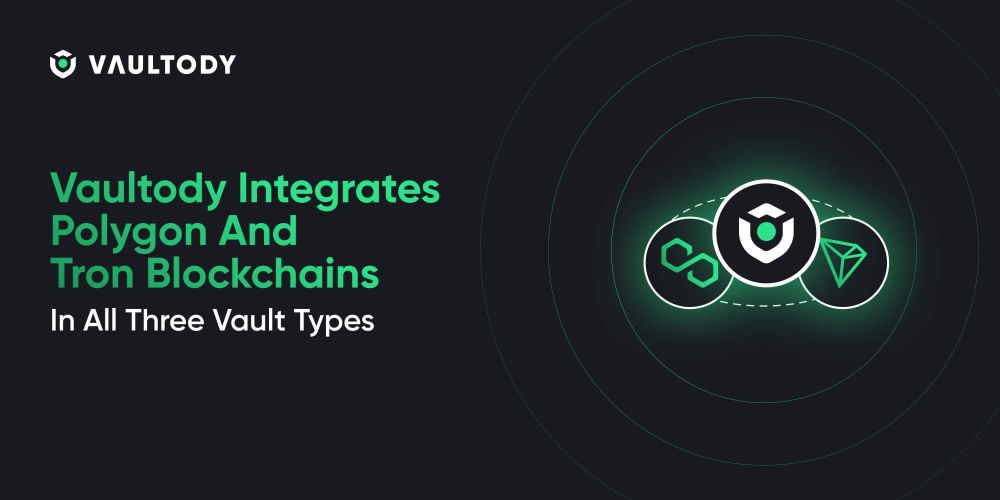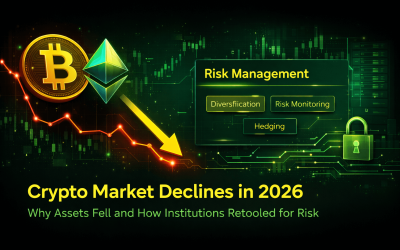Vaultody is excited to announce the continued expansion of our supported networks, with the addition of two new blockchains: TRON and Polygon. In a previous blog post, we shared that Polygon had already been integrated into our General Vault, and our team was diligently working to bring this popular blockchain into our Smart Vaults and Automation Vaults as well. Today, we are thrilled to confirm that this integration is now complete! Our clients can now securely store, transfer, and manage assets on the Polygon network across all three of our vault solutions: the General Vault, Smart Vault, and Automation Vault.
But that’s not all - we’ve also introduced support for another highly popular blockchain protocol known for its speed and minimal transaction fees: the TRON blockchain. TRON has now been fully integrated into our vault ecosystem, and is available across our General, Smart, and Automation Vaults. This means that our clients can enjoy the same seamless asset management and security features for TRON-based assets as they do for other supported networks.
Why Polygon blockchain?
Polygon, previously known as Matic Network, is a cutting-edge protocol and framework designed to build and connect Ethereum-compatible blockchain networks. It effectively tackles some of Ethereum's most significant challenges, such as high transaction fees and slow processing speeds, all while maintaining robust security standards.
Due to its growing popularity and the increasing demand from our customers, Polygon has quickly become one of the most sought-after blockchain protocols in our portfolio. This overwhelming demand was a driving factor behind our decision to prioritize its integration, even as we continue to prepare other leading blockchain networks for future inclusion in our offerings. By integrating Polygon early, we're ensuring that our clients have access to a powerful, scalable, and efficient blockchain solution that meets their evolving needs.
Why Tron blockchain?
Tron`s popularity comes from its high transaction speed, making it faster than many other blockchains such as Ethereum. It is scalable, efficient and offers very low transaction fees, making it attractive to users who would like to transfer assets or interact with decentralized applications (dApps) without worrying about high costs.
It is also an Ethereum Virtual Machine (EVM) compatible protocol meaning developers can easily port Ethereum dApps to the Tron network. This interoperability has helped TRON attract projects and users from the Ethereum ecosystem.
Moreover, there is a variety of TRC-20 assets (the most popular Tron token standard) for implementing smart contracts and issuing assets running on the Tron blockchain. All TRC-20 tokens run on the same network as the Tron native TRX coin and are now fully supported.
TRX Freezing Feature
Our team is working on integrating TRX freezing into our MPC (Multi-Party Computation) solutions. This new feature will allow clients to freeze either a portion or the entire TRX balance available in a specific address of their choice. Once frozen, the TRX assets are locked and cannot be moved or used until they are unfrozen.
TRX freezing offers an additional, cost-effective method for our customers to further reduce their transaction costs. In the Tron ecosystem, two key resources - bandwidth and energy - are essential for completing transactions. Bandwidth is primarily used for TRX transactions, while both bandwidth and energy are required for transactions involving other assets, such as USDT.
When a portion of TRX is frozen, the assets are temporarily locked for a specific period, during which they generate bandwidth and energy. After this period, clients have the option to unfreeze their TRX assets, making them available for use again.
Alternatively, transaction fees on the Tron blockchain can also be covered through TRX burning. By transferring and burning a small amount of TRX, the necessary bandwidth and energy for the transaction can be obtained.
How Do I Benefit From The Two Protocol Integrations?
The integration of TRON and Polygon protocols offers significant advantages, but the specific benefits can vary depending on your business operations. To help you understand the potential impact, we've outlined several scenarios that demonstrate how these integrations can enhance your processes and clarify the distinct use cases for our three vault types.
- Save on Blockchain Network Fees: Reduce your transaction fees by utilizing our Smart Vaults or Automation Vaults. Both vaults incorporate a "station address" that centralizes all transaction fees, effectively eliminating wallet dust from child addresses. This feature is particularly advantageous for cost-cautious businesses operating on the TRON network or other low-fee blockchains, enabling significant cost savings - up to 90% for batch transactions and up to 50% for single transactions. This cost-cutting benefit is also available for all other supported protocols within both Smart and Automation Vaults and it is not limited to Tron.
- Create Transactions: For transactions that require manual execution, our General Vaults and Smart Vaults are the ideal choices. Note that manual transactions are not supported in Automation Vaults, which are designed for automated processes. Here’s where it gets interesting, and we want to emphasize the importance of the following: in General Vaults, clients can initiate transactions directly from their dashboard, while in Smart Vaults, transactions can only be created via API. Automation Vaults operate based on predefined rules, automatically completing transactions when conditions are met.
- Fully Automated Transactions: If you need to perform fully automated transactions, our Automation Vault is the perfect solution. To leverage the automation capabilities of this vault, you'll need to define your automation rules. Without these rules, transactions will fail to process.
- Perform Batch Transactions: You will be able to execute batch transactions for assets on both TRON and Polygon blockchains very soon (this is currently in its development stage). To do this, you'll need to use our Smart Vaults or set up automated rules in our Automation Vaults, enabling you to efficiently manage bulk transactions.
- Smart Contract Protocols: Our Smart Vault is specifically designed for managing funds on smart contract supported protocols, including TRON and Polygon. In contrast, our General and Automation Vaults also support unspent transaction output (UTXO) protocols like Bitcoin, Litecoin, Dogecoin, Dash, and ZCash, offering broader flexibility for asset management. Very soon we will extend the number and type of protocols that we support in Smart Vaults, so stay tuned!
- Transaction Policy Management: Transaction policy features allow account owners to set rules for their vault transactions, such as different approval levels and team member permissions. This feature is available in both General Vaults and Smart Vaults. Since Automation Vaults operate based on predefined automation rules, they do not require additional input from team members, and therefore transaction policy management is not applicable. However, you can manage assets on Polygon and TRON blockchains with or without transaction policies as needed.
Here are some of the key use cases and benefits that the integration of Tron and Polygon can offer our users. To fully optimize your Vaultody experience, it's essential to choose the right vault type for your business operations.
If you're uncertain about which option is best for you, our team is here to provide expert consultation and advice on maximizing the potential of our MPC solutions. Contact us today to begin protecting and managing your assets with the most advanced security technology available on the market.









 Copy link
Copy link